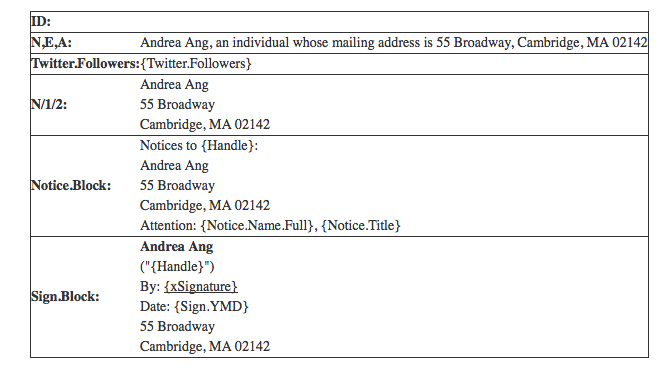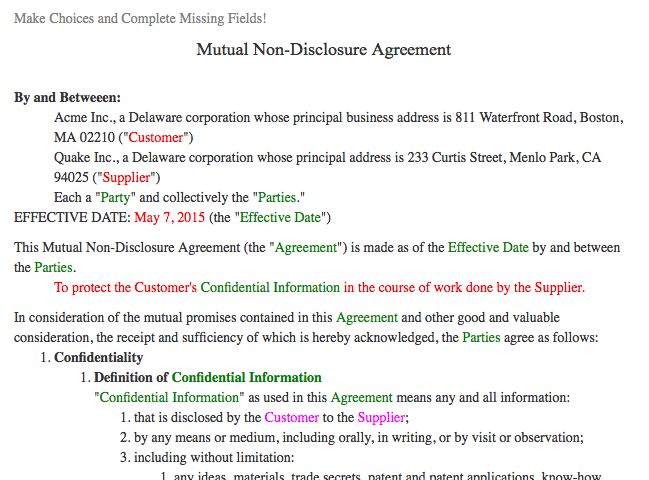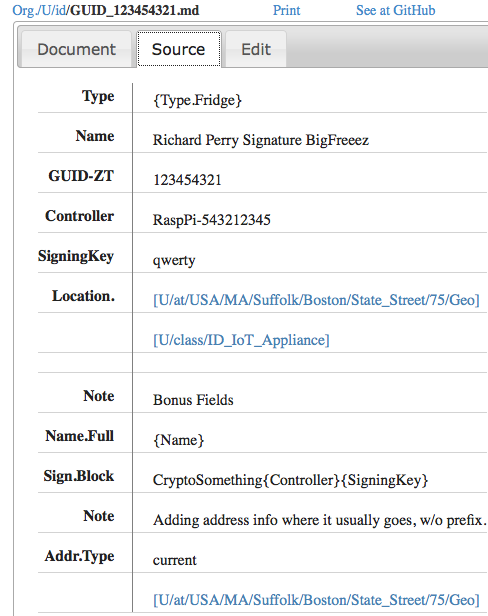May 12, 2015
Using CommonAccord to build "First Class Persons"
| Paraphrasing from James' Twitter storm response to The Sum of All Chains: |  |
|
A way to organize similarity of "First Class Person" is to build them from objects. Andrea -> ID_She -> ID_Individual - ID |  |
|
which permits an example such as an NDA: P1-> Acme -SIGN-> Andrea (in graph notation). The text is codified in layers as with CSS, as per an example template including work by #CooleyGo and @Emperor_Chan, and stored in GitHub with history. The proof of the transaction is k=v pairs on the blockchain. The proof of the boilerplate is either on chain or off, as you wish. |  |
If corporations have rights, maybe your fridge should assert some too? Here below is the three tabs of the CommonAccord interface that in this case is asserting the identity of an Internet of Things device (ID-IoT).
 |  |  |
Which leaves open - how to manage identity?
May 01, 2015
Proof of Work is now being put to work - toasters!
FtAlpahville's has just revealed what revealing that 21Inc (formerly 21e6) are doing exactly that.
Its core business plan it turns out will be embedding ASIC bitcoin mining chips into everyday devices like USB battery chargers, routers, printers, gaming consoles, set-top boxes and -- the piece de resistance -- chipsets to be used by internet of things devices.21 Inc wants to put your toaster to work, forging our cryptocurrency future.
Interesting, because 21Inc currently holds the record for the biggest funding round - 116 million dollars! Here although the link will not last long.
It seems like the notion of heating ones house with residual heat from Bitcoin mining has been around for a long term, see slashdot from 2011.12.21, Gavin Andresen from 2013.04.09:
I can imagine bitcoin-mining electric hot water heaters installed in homes all across the world, installed by thousands of private companies that split the profits with homeowners.
More: FTAlphaville from 2014.09.05 which calls it "the latest fad." Vitalik Buterin also spotted the security argument in 2012.02.28:
"If miners figure out that they can dual-use their mining electricity by making their computers heat their homes during the winter, that would be a very positive change since it would decentralize mining to something every home or business does rather than a task done by centralized, specialized supercomputers and it would increase the network's hash power and thus security but it would not ultimately reduce the mining cost."
This all by the way of linking to some musings I wrote back in 2014, late to the game it seems, and maybe calling a fad was accurate. What seems clear is that the world is not happy about the efficiency of Bitcoin, and until this is addressed more comprehensively, the bitcoin core will stand at odds with the world. E.g. This might be the wrong moment in history to tell the mass market that our solution to the banking crisis is to gratuitously waste energy.